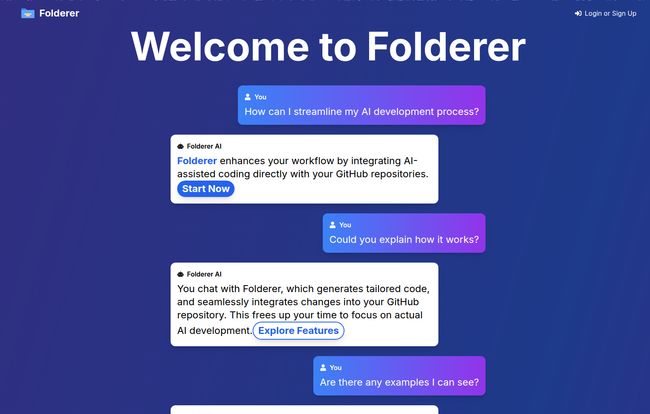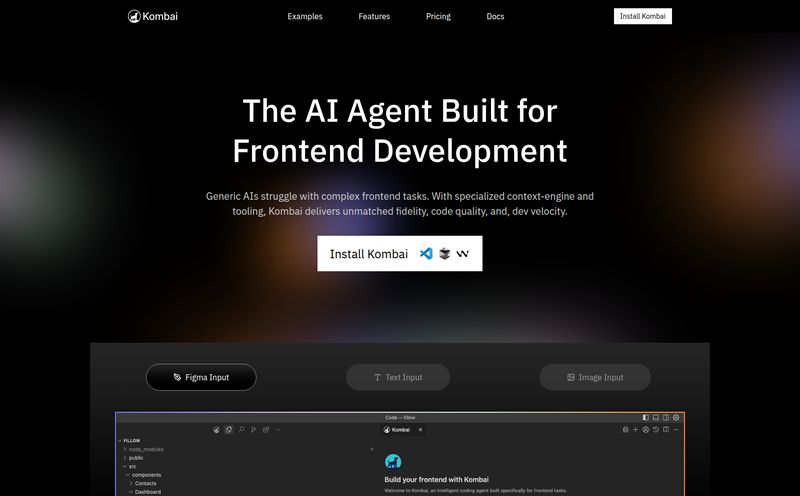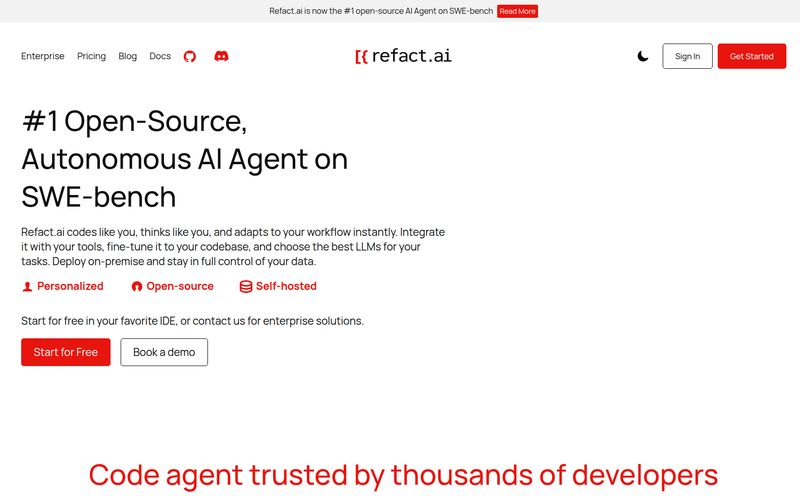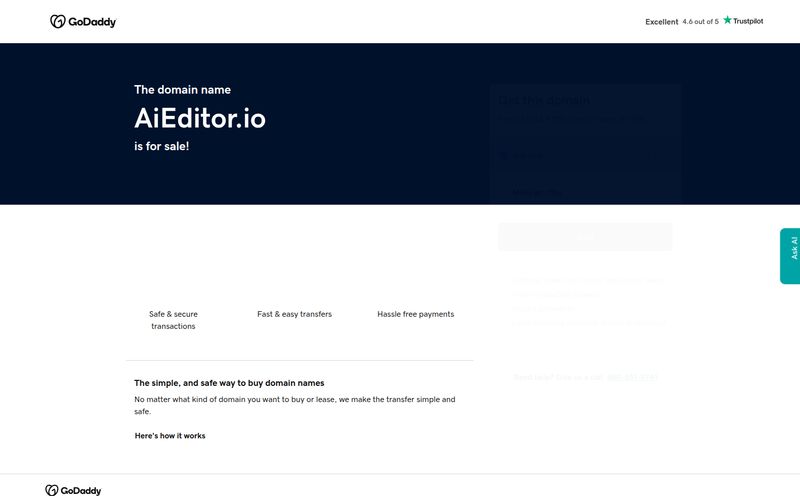We’ve all been there. That spark of a brilliant new app idea hits you at 2 AM. You jump out of bed, grab your laptop, and then... you spend the next hour just setting up the project. Creating folders. Installing dependencies. Writing the same boilerplate code you’ve written a hundred times before. By the time you're ready to write the actual fun stuff, the inspiration has faded and all you want is to go back to sleep.
It’s the silent killer of side projects. The mundane, repetitive setup.
So when I stumbled across a new tool called Folderer, my professional curiosity was definitely piqued. Another AI coding assistant? The market is flooded with them. But the tagline got my attention: it generates and organizes code directly into your GitHub repository. No copy-pasting from a chatbot window. No downloading a zip file. You talk to the AI, and a few moments later, a new commit from 'Folderer AI' just... appears. Now that sounded interesting.
So, What is Folderer, Really?
Think of it like this: Folderer isn't just a chatbot that spits out code snippets. It’s more like a project manager and a junior developer rolled into one. You connect it to your GitHub account, open up a repository, and start telling it what to build. You can say something like, “Create a SaaS landing page using Next.js and Tailwind CSS,” and it doesn’t just give you a wall of code. It thinks about the structure.
It’ll come back with a plan, suggesting files like pages/index.tsx, components/Header.tsx, components/Features.tsx, and styles/globals.css. You give it the green light, and it gets to work, building out that scaffolding and populating it with surprisingly decent starter code, right inside your project. The whole process feels less like prompting an AI and more like delegating a task.

Visit Folderer
My First Spin With Folderer
To really put it through its paces, I decided to try one of the examples on their homepage: the AI Job Impact Calculator. Sounded complex enough to be a good test. I created a new, empty repo on GitHub, linked it to Folderer, and typed in my request.
The AI came back with a proposed file structure. It was logical. It had a main app component, a form component for user input, and a results component to display the output. I clicked ‘proceed’ and watched my GitHub repo. A few seconds later, a commit popped up. It was all there. The files, the folders, the initial code. It was... well, it was kind of magical, not gonna lie.
Did the app work perfectly out of the box? Not quite. I had to go in and make some manual edits, fix a small logic error in the calculation, and tweak the UI to my liking. But here’s the thing: all the mind-numbing setup was done. I got to jump straight to the interesting problem-solving part. It probably saved me a solid hour of boring work. Total game-changer.
The Big Deal: Features I Actually Care About
After playing around for a bit, a few things really stood out to me as being more than just gimmicks.
The Seamless GitHub Sync
This is Folderer’s killer feature, hands down. I’ve used plenty of AI tools, from ChatGPT to GitHub Copilot (which is fantastic in its own right). But they mostly operate on a line-by-line or file-by-file basis. Folderer thinks in terms of whole features or projects. The difference is like getting a recipe emailed to you versus having a chef show up in your kitchen and start prepping the ingredients. It completely changes the workflow and removes that layer of friction between idea and execution.
The AI as a (Pretty Smart) Junior Dev
The code quality is surprisingly good. It follows best practices, uses the frameworks you specify, and even adds comments. It's not going to write a complex, novel algorithm for you. But for generating boilerplate, creating components, and setting up project structures? It's brilliant. I'd still want a human to review the code before it goes to production, obviously. The AI is a fantastic starter, not a finisher. It gets you 80% of the way there in 10% of the time.
An Automatic File Janitor
I genuinely hate creating files. It feels like such a chore. The fact that Folderer not only writes the code but also creates the correct files in a logical directory structure is a small detail that has a huge impact on my workflow. It keeps things tidy from the get-go, which is something even experienced developers can get lazy about on a new project. It’s like having a little assistant who constantly cleans up your workspace.
Where It Shines and Where It Stumbles
No tool is perfect, right? Folderer is incredibly promising, but it's important to have a realistic view of what it is and isn't.
The Good Stuff
For rapid prototyping and starting new projects, this thing is a beast. If you're a founder trying to build an MVP over a weekend or a developer who wants to quickly test an idea, Folderer could be your new best friend. It dramatically cuts down the time from concept to a working proof-of-concept. It helps you stay in that creative “flow state” instead of getting bogged down in administrative coding tasks.
The 'Hmm, Not So Sure' Parts
The biggest caveat is that you must know how to code to use it effectively. Because the AI isn't flawless, you'll inevitably need to debug or modify its output. A beginner might get stuck, not knowing if the problem is their prompt or the AI's code. Also, the requirement for a GitHub repository is a hurdle if your team uses something else like GitLab or Bitbucket. For most modern devs this isn't an issue, but it's a constraint to be aware of.
What’s the Damage? A Look at Folderer's Pricing
And now for the million-dollar question... what does this AI magic cost? I clicked on the pricing link, ready to see the different tiers and plans. And I was greeted with... a 404 page. Awkward.
Now, this could mean a few things. It's possible the tool is so new they haven't finalized pricing. It could be in a free public beta phase to gather feedback. Or maybe the link was just temporarily broken. My take? This is actually a great opportunity. It means you can likely jump in and try it out right now without pulling out your credit card. It’s a chance to get in on the ground floor of a potentially powerful platform. I’d recommend trying it sooner rather than later, just in case a pricing page suddenly appears.
Frequently Asked Questions About Folderer
1. How does Folderer work with existing projects?
From my testing, Folderer excels at starting new projects from scratch. You can point it to an existing repository, and it can add new features or components to it. It's smart enough to read the existing context to some extent, but it seems most powerful when building out new functionality or projects.
2. Is the code generated by Folderer production-ready?
I would say no, not without a human review. Think of the generated code as a very strong first draft. It's well-structured and generally functional, but you should always review, test, and refine it just as you would with code from a junior developer.
3. What coding languages and frameworks does Folderer support?
The examples on the site heavily feature JavaScript and TypeScript, specifically with frameworks like Next.js and React. It's clearly optimized for modern web development stacks. You could likely prompt it for other languages, but its best performance seems to be in the JS ecosystem.
4. Is Folderer just another version of GitHub Copilot?
Not really. They're different tools for different stages of development. GitHub Copilot is an amazing autocomplete and line-by-line code suggestion tool that lives inside your editor. Folderer is a higher-level tool for project scaffolding and feature generation that works at the repository level. They could actually be used together quite effectively.
5. Do I need a GitHub account to use Folderer?
Yes, a GitHub account is required. The entire workflow is built around direct integration with GitHub repositories, so it's a non-negotiable part of the process.
My Final Take: Is Folderer Worth Your Time?
So, is Folderer the future of software development? Maybe not the entire future, but it's a fascinating glimpse of what's to come. It's not here to take your job. It's here to do the boring parts of your job so you can focus on the creative, challenging, and fun parts.
I'm definitely keeping Folderer in my digital toolbox. For spinning up a quick proof-of-concept, for tackling a hackathon project, or just for getting a new side project off the ground without the initial drag, it's an incredible asset. It won't replace a skilled senior developer, but it might just be the best, most efficient junior dev I’ve ever worked with. And the best part? It doesn’t even touch the office coffee.



